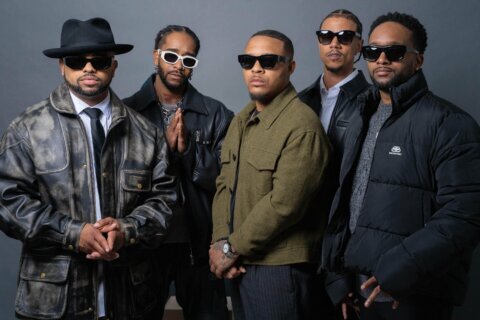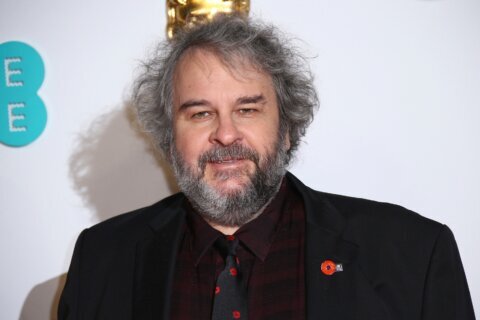Hulu viewers are currently enjoying the new documentary “Freaknik: The Wildest Party Never Told,” but did you know that the Atlanta festival was actually sparked by creative folks from our area?
WTOP caught up with D.C. natives Amadi Boone, Monique Tolliver-Logan and Emma Horton-Ferguson, who were pivotal in Freaknik’s creation in Atlanta when they were college students back in the early ’80s.

“I grew up here in Washington D.C. and was a student at Woodrow Wilson High School, left D.C. and went to Morehouse College in Atlanta, Georgia, where I joined an organization of students in the Atlanta University Center [called] the D.C. Metro Club,” Boone said. “I eventually became the president of the D.C. Metro Club and I was the president at the time of the founding of our event that came to be known as Freaknik.”
The event was founded in 1983 for a cluster of historically Black colleges and universities in the Atlanta University Center Consortium, including Morehouse, Spelman, Clark Atlanta and Morris Brown colleges.
“I hail from Southeast D.C. but I went to school at Potomac High School in Maryland,” Tolliver-Logan said. “When I came to Spelman College in 1982, I joined the D.C. Metro Club. During that year, our club founded what came to be known as Freaknik. Prior to the spring of 1983, they had been having picnics every spring, but it was during the year of ’82-’83 that we decided through our executive board to take it up a notch.”
The title came from combining the dance “The Freak” and the term picnic — hence “Freaknik.”
“We were definitely known as the fun club,” Boone said. “Tony Towns, who actually was my classmate at Woodrow Wilson High School, was the D.C. Metro Club vice president when I was president,” Boone said. “He came up with the idea of, ‘Let’s bring back The Freak.’ … Chic had ‘Le Freak,’ Rick James had ‘Superfreak,’ so we just brought back that name to our parties. That’s how it came to be merged into the title of our spring picnic.”
The documentary shows how the humble beginnings of Freaknik were much more innocent.
“In the early days, our focus was really on us having a fun spring break activity,” Boone said. “Many people didn’t get to go home for spring break, maybe it was for financial reasons, maybe they had school work they had to wrap up and couldn’t travel. … This was hot dogs, beer and chips in the park. … This was more of a student event, it was nothing scandalous about it. It was just college students having a good time.”
Their goal was not only to party, but also to get a chance for community service and cultural exchange.
“You hear today people talk about, ‘Oh, I’m an influencer’ — that word wasn’t a thing,” Tolliver-Logan said. “We wanted to bring Washington, D.C. culture to the Atlanta University Center: our dance, our music — go-go music as you know is very different from any other music — so we were trying to influence the AUC culture of students from other states with the Chocolate City flavor, if you will, so we were the original influencers.”
“We weren’t just influencing Atlanta, we were influencing the HBCU with what we grew up with, what we valued and what we held and still hold precious to this day,” Horton-Ferguson said. “We were being college students, young, gifted and Black, organized and unified. … We just took it to the street, or to the park … then the streets got involved and it became something totally different.”
Soon, the concept entered pop culture thanks to Spike Lee’s “School Daze” (1988), which was based on Morehouse College, and NBC’s “A Different World” (1987-1993), which saw its characters attend Freaknik.
“When you look at ‘School Daze’ and Spike Lee, he’s a Morehouse man, so he has the experience, he knows the culture,” Horton-Ferguson said. “To hear ‘A Different World’ talking about Freaknik on TV, it still blows my mind even when I look at the reruns syndicated. We had no inclination what we were doing.”
By the ’90s, the annual event blew up into a destination for out-of-town spring breakers, drawing celebrities from 2Pac to Notorious B.I.G., even three of the University of Michigan’s Fab 5 hoopsters.
“I was surprised to learn through watching the documentary how much the event we started, Freaknik, became the platform for so many of Atlanta’s talented musicians and producers to have a place and a stage to showcase all they had to offer,” Boone said. “It really gave birth to Atlanta as the hip-hop center of the South [with Jermaine Dupri, Ludacris and 21 Savage]. They built that event on top of the Freaknik that we created.”
However, the festival eventually gained negative media attention for excess partying.
“It grew and grew and grew, and at some point there was this transition where the students kind of lost control of the event,” Boone said. “The organization was kind of taken over by another entity, if you will. … Now there were tens of thousands of people, up to 100,000 people. I was amazed at hearing these stories.”
Freaknik was eventually shut down in 1998, leaving only memories of a different era.
“I’m really pleased with how well they showed the journey from the beginning to the unfortunate demise,” Tolliver-Logan said. “The Olympics came in ’96 … and it was because of the Olympics that they no longer wanted Freaknik to be an event because Atlanta became the world stage. … My understanding is that a lot of the support that they had hoped to get from the city in those latter years, I don’t think they were able to get.”
Now, the rise and fall of Freaknik is documented for all to see on Hulu.
“When we started it, we didn’t know that it would become a movement, but it’s just amazing to sit back and look at what our club did,” Tolliver-Logan said. “A lot of my pictures were used in the documentary. I did not know at the time when I was taking pictures for the yearbook that I would be able to use those pictures on a big screen. It’s a testament that when you’re doing something one day, you don’t know what it’ll blossom into.”
Hear our full conversation on the podcast below:
Get breaking news and daily headlines delivered to your email inbox by signing up here.
© 2024 WTOP. All Rights Reserved. This website is not intended for users located within the European Economic Area.








